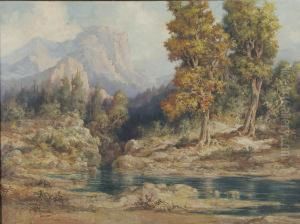David Swing Paintings
David Swing was not primarily known as a visual artist but rather as an influential American clergyman and professor in the 19th century. Born on September 23, 1830, in Cincinnati, Ohio, Swing grew up in a period of significant social and religious transformation in the United States. He pursued his education at Miami University in Oxford, Ohio, where he showcased his intellectual prowess, graduating with high honors. After completing his studies, Swing felt a strong calling towards the ministry and subsequently enrolled at the Lane Theological Seminary to prepare for his religious vocation.
After his ordination, Swing served in several Presbyterian churches, demonstrating a unique blend of theological insight and progressive thought. His approach to Christianity was characterized by a broad-minded and inclusive perspective, which eventually led to controversy. Swing's theology, which emphasized a loving and forgiving God over the harsher dogmas of predestination and eternal damnation, attracted a large following but also stirred significant debate within the Presbyterian community.
In 1871, Swing was called to the Fourth Presbyterian Church of Chicago, a move that marked the beginning of his most influential period. His sermons drew large crowds, enchanted by his eloquence and his liberal theological stance. However, his growing popularity and unorthodox views led to charges of heresy by more conservative elements within the Presbyterian Church. The subsequent trial in 1874 was a landmark event, resulting in Swing's acquittal. Despite this, the controversy led him to resign from his position and establish the Central Church of Chicago, a nondenominational congregation that became a beacon for liberal Christianity in the Midwest.
Swing was also a respected academic, serving as a professor of sacred rhetoric at the Union Theological Seminary in Chicago. His lectures and writings, which covered a wide range of topics from theology to literature and social issues, were widely admired for their depth and insight. David Swing's influence extended beyond the pulpit; he was a prominent figure in the cultural and intellectual life of Chicago, contributing to the city's moral and social development during a period of rapid growth and change.
David Swing passed away on October 3, 1894, leaving behind a legacy of religious tolerance and intellectual freedom. His approach to Christianity, which prioritized love, forgiveness, and human dignity over doctrinal rigidity, had a lasting impact on American religious thought and opened the way for more liberal interpretations of the faith. Swing's life and work offer a fascinating glimpse into the religious and cultural dynamics of 19th-century America, highlighting the tensions between tradition and progress that defined the era.



